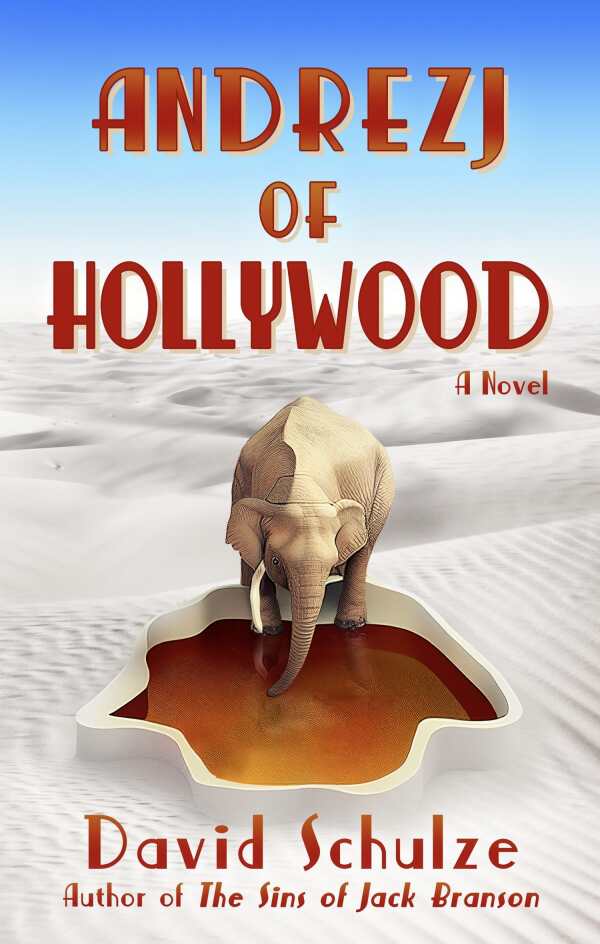
Andrezj of Hollywood
A Novel
Rich, philosophical, and engaging, Andrezj of Hollywood weighs the cost of compromising to pursue one’s dreams.
Weaving together many strands from the life of an aspiring young screenwriter, David Schulze’s Andrezj of Hollywood is an epic bildungsroman that meditates on love, ambition, and the path to a happy life.
Jacob Andrezj, an inchoate twenty-one-year-old, is fresh from a study-abroad semester in Florence. Now, he’s eager to embark on a career in Hollywood. But while he’s finishing his undergraduate screenwriting degree, his world turns upside down: he falls in love with Stewie, an older man who forces him to rethink his foundational ideas about politics, family, friendship, and success.
However, this conflict only represents one-third of the novel. Alternating chapters follow Jacob at two other points in his life as well: in one thread, he has just arrived in Los Angeles as an intern to a Hollywood producer, desperate to earn a place in the cutthroat industry; in the other, he is years older and works as a powerful film executive who has to reckon with the corruption and betrayal he’s perpetrated in order to succeed.
Separately, each storyline represents a well-observed episode of Jacob’s life. Each unfolds as a succinct, engaging narrative with its own plot and pacing. They also move back and forth between ordinary prose and screenplay-inspired writing that emphasizes propulsive, character-driven scenes with an abundance of snappy dialogue. However, the shifts from prose to screenwriting are somewhat haphazard early on in the book.
Once the book finds its footing, it proves to be rich, philosophical, and engaging. There are meditations on the ways in which Jacob’s early decisions continue to resonate in his later years. Fights with his mother led to years of estrangement and regret, for example, and his failure to communicate with his roommates led to the decision to cut a friend out of a movie deal. He contends with existential struggles once he’s successful, working to survive as a top Hollywood producer. It’s a thought-provoking depiction of the relationship between fate and freedom, made stronger because of the book’s three unique beginnings and endings: this is a novel that reveals the web of influences and consequences that Jacob is caught in.
Set against a backdrop of Donald Trump’s election and the national political schism, the book’s environment is wide in scale and breadth. Difficult and topical subjects—such as the correct way to respond to an artist’s foul behavior, how to navigate conversations with a political adversary, or why someone would vote for Donald Trump—are broached and investigated with shocking honesty. Characters from a wide range of social backgrounds and with differing political beliefs populate the story and freely discuss their feelings about the world.
The narrative itself remains scrupulous about staying above any particular debate, though, preferring to explore viewpoints rather than judge its characters. Indeed, Andrezj of Hollywood proves to be most opinionated in the realm of movies. The influence of films like Moonlight and La La Land can be felt in its tripartite structure and surprising ending, but more quotidian film commentary also permeates the story. The recurring presence of the Academy Awards adds an arresting sense of verisimilitude as Jacob watches, bets on, and attends the real event, providing an informal review of the award show’s recent history.
An impressive story of a man’s pursuit of his dreams, for which he suffers some consequences, Andrezj of Hollywood is a rich, layered, and satisfying novel.
Reviewed by
Willem Marx
Disclosure: This article is not an endorsement, but a review. The publisher of this book provided free copies of the book and paid a small fee to have their book reviewed by a professional reviewer. Foreword Reviews and Clarion Reviews make no guarantee that the publisher will receive a positive review. Foreword Magazine, Inc. is disclosing this in accordance with the Federal Trade Commission’s 16 CFR, Part 255.
